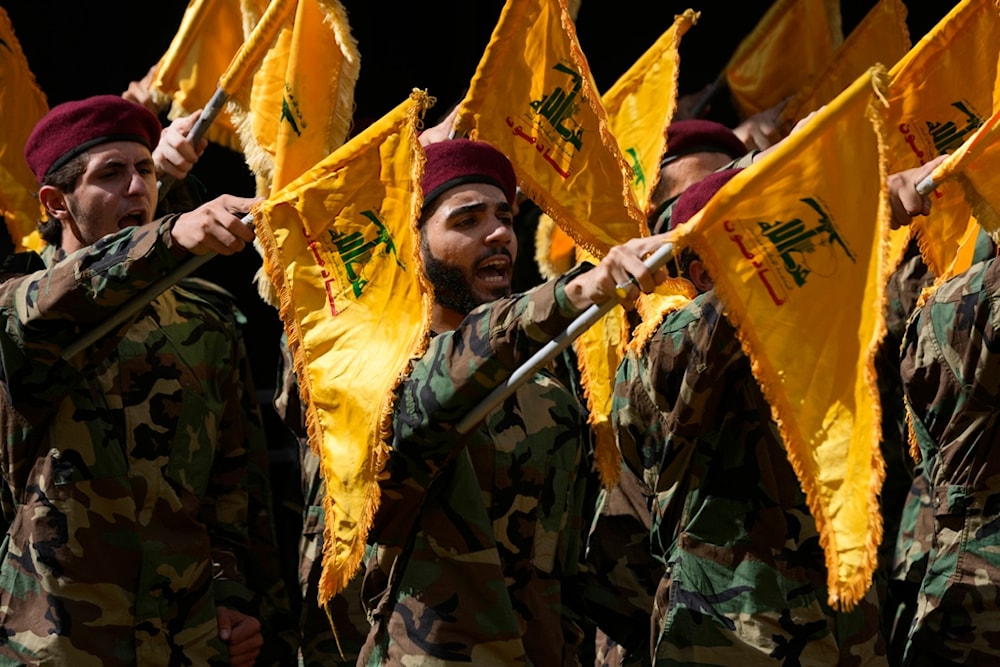Israeli ground offensive in Lebanon could lead to costly quagmire: WSJ
The Wall Street Journal warns that "Israel's" technological advantages may not prevent a prolonged and costly conflict if it launches a ground offensive against Hezbollah in southern Lebanon.
-

Hezbollah members attend the funeral of two of their comrades who were killed on Wednesday when a handheld device exploded, during a funeral procession in the southern suburbs of Beirut, Thursday, Sept. 19, 2024. (AP Photo/Hussein Malla)
The Wall Street Journal published a report on Monday discussing the current escalations occurring along the Lebanese-Palestinian border and the potential repercussions that could ensue if the Israeli regime proceeds with launching a ground offensive on southern Lebanon.
Tensions have reached an all-time high after the Israeli regime orchestrated a series of terrorist operations targeting communication devices, followed by an airstrike on a Beirut suburb, and intensive airstrikes on the southern and eastern regions of Lebanon.
Although "Israel's" aggressions have demonstrated extreme levels of violence "that put the Lebanese militant group on the defensive and demonstrated Israel's vast superiority in intelligence gathering and technology," the dynamic is likely to change if a ground war breaks out in Lebanon, the newspapers says, as "Israel will be fighting on Hezbollah's turf, where its advantages in technology and intelligence won’t be as decisive."
Hezbollah, which has continued to strike Israeli targets for about a year in support of the resistance in the Gaza Strip, has maintained a "has kept in reserve a massive arsenal of rockets, drones and antitank missiles that it can deploy to counter Israeli advances."
Among Hezbollah's new and most dangerous weapons is the "guided antitank missile called Almas", which gives Hezbollah "a much higher degree of precision in its strikes than it had when it last fought a war with Israel in 2006" when the last war between Hezbollah and "Israel" took place, with Israeli estimates suggesting Hezbollah possessed about 12,000 rockets and missiles at the time.
Read more: War on Lebanon: 558 killed, 1835 injured by 'Israel'
Observers believe that the Almas missile is " a reverse-engineered version of an Israeli missile called the Spike, which was likely captured by Hezbollah and sent to Iran in 2006," a fact confirmed by a resistance leader through Al-Mayadeen last February.
In an article published on February 1 by Haaretz, it was stated that the Almas missile is a version of one of the advanced anti-tank missiles in Israeli forces' arsenal. The article indicated that its origin is the Spike missiles of Israeli manufacture, several of which fell into the hands of Hezbollah as spoils in 2006.
The newspaper saw this as an example of Iran's ability to replicate Western ammunition, as it has done with many types of missiles, drones, and other combat tools that fell into its hands. It pointed out that Iran is a relatively advanced state, capable of taking such systems and replicating them with a high level of similarity and proximity to the original version. Iran has proven its effective improvisational capabilities on numerous occasions, the article noted.
#الإعلام_الحربي في #المقاومة_الإسلامية ينشر مشاهد من عملية استهداف حامية موقع بركة ريشا التابع لـ "جيش" الاحتلال الإسرائيلي عند الحدود اللبنانية الجنوبية.#لبنان #الميادين_لبنان pic.twitter.com/DG3zMBR6cZ
— الميادين لبنان (@mayadeenlebanon) June 4, 2024
Returning to the WSJ report, Almas can be compared to other advanced anti-tank missiles, such as the American Javelin, as it gives Hezbollah "the ability to strike with greater precision than in previous conflicts, when it relied largely on unguided weapons."
Lebanon is to 'Israel' what Vietnam is to the US
According to the report, "Israel" will face what it encountered in 2006, when it "ended up at a dead end," and that if a ground war breaks out, it would turn into "a quagmire for Israel, just like in Gaza."
"It's a little like saying to the United States in 1980, 'Let's go back into Vietnam,'" remarked Daniel Byman, a senior fellow at the Center for Strategic and International Studies in Washington and a former US government official who co-authored a study on Hezbollah's arsenal.
WSJ quoted retired Israeli army brigadier general Assaf Orion as saying "It's not going to be a walk in the park" if there is a full-scale war, said Assaf Orion, adding, "There’s no way we’re not getting a bloody nose."
Read more: Hezbollah strikes key Israeli bases in defense of Lebanon, its people
The regime faces "strategic disadvantages" in confronting Hezbollah, despite "Israel's possession of more advanced weaponry, including F-35 jet fighters and multilayered air defenses," the newspaper noted.
In this regard, WSJ notes that "Hezbollah wouldn’t seek to win a war with Israel in a conventional sense. Rather, it would aim to mire Israeli forces in a war of attrition, much as Hamas, a smaller and less well-armed group, has managed to survive Israel's 11-month assault on Gaza."
The paper also notes that US military experts believe "could copy tactics used by Russia in Ukraine, launching salvos of missiles and swarms of drones in efforts to overwhelm or disable Israel's air defenses and strike military bases or ports and the country’s electrical grid" while Israeli officials expect "hundreds of people to be killed."

 5 Min Read
5 Min Read








